06-19-2017
We are pleased to announce that version 12.7.0 of the Lingotek Translation Management System was released today. This release includes many exciting enhancements, including Linguist Quality Checks, Offline Translation, DTP File Upload, and Much More!
- Linguist Quality Checks
Quickly identify and correct hundreds linguistic errors of with Lingotek's automatic Quality Checks. - Offline Translation
Get the best of both worlds with Lingotek's centrally stored files and SDL Trados Studio 2017's robust editing features. - DTP File Upload
DTP professionals can upload their completed work to Lingotek.
Quality Checks
Quickly identify and correct hundreds errors of with Lingotek's new Quality Check tool.
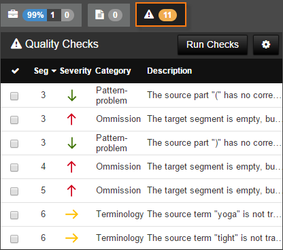
Running a quality check quickly and automatically pinpoints:
- Localization Problems: Incorrectly localized dates, times, or numbers
- Missing Content: Omissions, additions, and untranslated elements
- Markup Problems: Missing tags
- Length Problems: Translations suspiciously shorter or longer than expected
- Terminology Compliance: Required terminology was overlooked
Offline Translation
Now linguists get all the benefits of sharing TM on Lingotek while still using SDL Trados Studio 2017. For convenience, users can export their assigned files as XLIFF, import them into SDL, and then re-import the completed file into Lingotek.
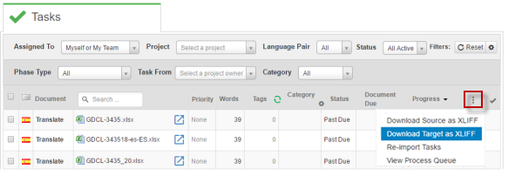
XLIFF Export/Re-import, SDL Trados Studio
- XLIFF Import/Export. To facilitate offline translation, linguists can export their assignments as XLIFF files. These files can be opened in SDL Trados Studio and then reimported to Lingotek once translation is complete.
- Grant Permissions for Offline Translation. If desired, administrators can give linguists the ability to translate in SDL Trados Studio. To do this, an administrator can allow linguists the ability to export their assigned tasks as XLIFF files and then re-import the completed translation to Lingotek.
Re-import Processing
- Edited Segments. When an approved segment is edited in SDL Trados Studio and the file is re-imported to the TMS, the modification is now preserved.
- Locked Segments. If a leveraged segment is locked in the TMS, that lock is passed to SDL Trados Studio. If a leveraged segment is not locked in the TMS, the lock is not passed to Trados.
- Mark Imported Documents Complete. If every segment is completed and saved in an offline CAT tool, when the file is imported into Lingotek TMS, the phase now shows as being 100% complete.
- Segment Notes. When exporting and re-importing XLIFF files between Lingotek and SDL Trados Studio, segment notes are now retained. This means that notes made in Lingotek are available in Trados Studio, and notes made in Trados Studio are available in Lingotek.
- Tag Support. We've added enhancements to tag support so that tags are handled properly during XLIFF Import/Export.
- TM Match. Segments leveraged from Lingotek TM no longer import into SDL Trados Studio as approved segments.
- Trados Document Metadata. In SDL Trados Studio, Lingotek document metadata fields appear as file-level notes (available on the Comments tab).
Upload Finalized DTP Files
Now DTP professionals can upload their completed work to Lingotek.
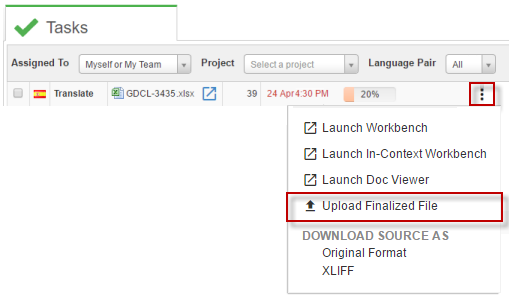
- DTP File Upload (Uploading Finalized Files). Now linguists can upload a finalized version of their completed work. Any file type is allowed, making it easy to share files generated by DTP - especially when the final version of the file is a different file format than the original source document. (e.g. A source file is IDML, but its final version is saved as INDD).
- DTP Bulk File Download (Downloading Finalized Files). We’ve added a bulk option that allows PMs to download a linguist’s finalized files in bulk. (If desired, linguists can also download their finalized assignments in bulk).
- DTP File Structure (Downloading Finalized Files). When downloading finalized files in bulk, the zip file is organized by document and by target.
More Enhancements
Documents
- Task List, All Filter. To help linguists find regularly updated documents, we have re-added the All option to the Status filter on the task list.
- Document Metadata, Document Category. We’ve added a Category field to the document metadata listed on the Document Settings page.
- Document Metadata, Duplicate Field. We removed a duplicate field (Source URL) from the Document Metadata screen.
- Update Due Date, Bulk Options. Now document due dates can be updated in bulk on the document, task, or phase level.
- Due Date Selector. We’ve also fixed a bug that caused the Due Date selector to throw an error.
Document Settings Tab. For clarity, we’ve changed the name of a field on the Document Settings tab. Due Reason has been changed to Reason for Date Modification.
- Edit Target. We fixed the Save button on the Edit Target modal (accessible on the Targets page).
Document Download
Download Source. Now users can download the source file without being required to download the target files.
Download Target. Download Target as XLIFF is now working properly.
- Relevant Targets. Rather than displaying all target languages in the project, the Download Document dialog now displays only the targets relevant to the selected documents.
System Architecture
Callback Handling. If a callback fails, the system automatically resends the callback. If the callback continues to fail, the system sends an alert to the project manager (so that appropriate action can be taken).
Job Queue Performance. Behind the scenes, we've improved the way system jobs (such as machine translation, TM leverage, reports, etc.) are handled. We've equipped Lingotek's back end to use the latest technology in queuing and scheduling, resulting in reduced job "traffic jams" and improved system performance overall. This new technology provides better reliability, visibility, and distribution of system resources.
Translation Memory
Preserving Inline Tags. Our TM importer has been enhanced to preserve inline tags when importing TM files (.tmx or .xliff).
Workflow
- Add Vendor to Workflow Phases. In this release, we’ve added the ability to assign a vendor to handle a phase listed on the workflow template.
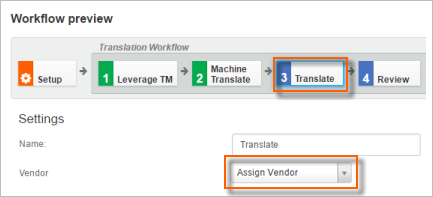
As the workflow runs, Cost and Invoice Reports will automatically pull in rate charts for the assigned vendor. - Language Counter (Projects, Workflows). To help PMs verify the number of languages on a project or workflow, we’ve added a language counter to the Add Document page and the Workflow Document Setup tab.
- Phase Complete. Copy Translations no longer marks a phase complete prematurely.
- Save Custom Phase. We resolved an issue that prevented project managers from saving custom workflow phases.
Workbench
- Character Counts. To assist the linguist, the workbench now lists the number of characters in each segment.
- Display Video Timestamps. To simplify translation for video subtitles, we’ve enhanced the .srt filter to display a subtitle's time stamp next to the each segment as a note.
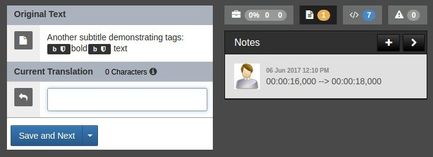
- Docx FPRM Filter Configuration. When a .docx file is uploaded, its author name metadata is no longer marked as a translatable segment.
- Settings Icon. The Translation Memory Settings icon opens as expected.
- Workbench Loading, Asia. Standard Workbench now loads as expected for freelancers in Asia.
Fixes
In the latest release, we've also made a number of fixes.
Document List
- New Heading, Document Actions Menu. On the Document Actions menu, we’ve added a new heading ("Modify") to make it easier to find the due date modification options.
- Permissions. We fixed a permissions issue that prevented users from uploading a finalized file.
Quality Checks
Filtering Options. We’ve added the ability to filter errors identified by the Quality Check tool. Search by Severity and Error Type.
- Enhanced Capacity for Large Files. Quality Checks perform more quickly on large documents.
- Ignored Errors. Once an error is ignored by a linguist, it will continue to be ignored even after the user logs out and when the document passes to subsequent phases.
- Number, Date, Time. We resolved an issue that was causing Quality Checks to over-identify number, date, and time errors.
- Text Unit. In the Quality Checks list, hovering over a segment summary reveals its Text Unit ID.
- Issue Types. We’ve organized Quality Check issue types to make them easier to find.
- Severity Icons. To make them more intuitive, we’ve updated the Quality Check severity indicators.
- Severity: 1 - Critical (Red; arrow pointing up)
- Severity: 2 - Major (Orange; arrow diagonal up right)
- Severity: 3 - Minor (Yellow; arrow down diagonal right)
- Severity: 4 - Trivial (Blue; arrow pointing down)